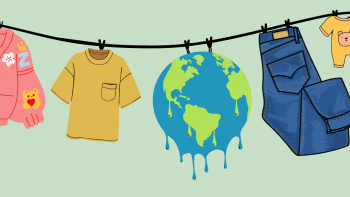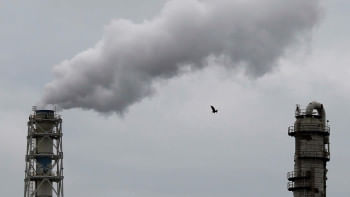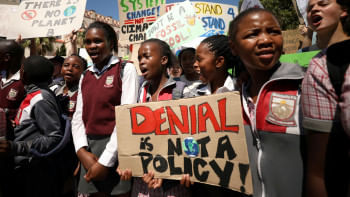Not reducing carbon emissions will result in devastation

In the battle against climate change, setting and achieving carbon emission reduction targets has become critical. These targets, often established on both national and international levels, aim to curb the release of greenhouse gases into the atmosphere, thereby mitigating the adverse effects of climate change. However, we have witnessed instances where these targets are missed or aren't met with the required urgency.
In my own industry of textiles and fashion, we are seeing more and more examples of companies missing their own emissions targets. Often, this is because fashion retailers can curb their own emissions but struggle to reduce emissions at Tier 3 – that is, the emissions of their suppliers.
Reducing emissions is tough. It takes a large-scale, coordinated effort and often requires considerable investment. In the short term, we could see job losses and disruption to supply chains as factories are required to absorb increases in costs, while the implementation of new technologies could be demanding.
Yet, the potential consequences of missing carbon emissions reduction targets do not bear thinking about. There are environmental, economic, social, and geopolitical ramifications to continuing on a business-as-usual path.
The consequences of missed carbon emissions reduction targets are not limited to the environment and the economy; they also deeply affect society. Vulnerable communities, often those with fewer resources and less resilience, are disproportionately impacted by climate change.
One of the most immediate and alarming consequences of missing carbon emissions reduction targets is the continued rise in global temperatures. Greenhouse gases, primarily carbon dioxide (CO2), trap heat in the Earth's atmosphere, causing the planet to warm up. When reduction targets are not met, the concentration of these gases continues to increase, leading to more severe and frequent heat waves, rising sea levels, and disruptions to ecosystems. This can result in the loss of biodiversity, harm to agricultural production, and the exacerbation of extreme weather events.
The melting of polar ice caps is also a direct consequence of rising global temperatures. When emission reduction targets are missed, the Arctic and Antarctic ice sheets continue to shrink at an accelerated rate. This contributes to rising sea levels, threatening coastal communities and low-lying islands. Furthermore, the release of freshwater from melting ice caps can disrupt ocean currents, impacting weather patterns and marine ecosystems globally.
Carbon emissions not only affect the atmosphere but also have dire consequences for the oceans. When excess CO2 is absorbed by seawater, it reacts with water molecules to form carbonic acid, resulting in ocean acidification. This harms marine life, particularly organisms with calcium carbonate shells and skeletons, such as corals, shellfish, and some species of plankton. Ocean acidification disrupts food chains and can lead to the collapse of vital fisheries, endangering the livelihoods of millions of people who depend on marine life.
Missing carbon emissions reduction targets amplifies the likelihood and severity of climate-related disasters. More frequent and intense hurricanes, droughts, floods, and wildfires may become the norm as the planet warms. These events cause widespread destruction of infrastructure, loss of lives, and displacement of communities. The economic toll of such disasters can be staggering, straining resources and recovery efforts.
We are already seeing the impact of extreme weather events in textile supply chains, and forecasters expect this issue to accelerate in the coming years. Climate change-related damages, including property damage, crop losses, and healthcare expenses, place a significant burden on governments, insurance companies, and individuals. Furthermore, industries reliant on fossil fuels may face increased regulation, higher operational costs, and potential stranded assets as the world shifts towards cleaner energy sources. In the long run, failing to address climate change can lead to reduced economic growth and job opportunities.
But the consequences of missed carbon emissions reduction targets are not limited to the environment and the economy; they also deeply affect society. Vulnerable communities, often those with fewer resources and less resilience, are disproportionately impacted by climate change. These communities may experience more significant health risks, food and water shortages, and displacement due to extreme weather events. Social inequalities can be exacerbated as climate change further strains already marginalised populations.
The global nature of climate change and the interconnectedness of nations make it a significant geopolitical issue. When countries fail to meet their carbon emissions reduction targets, tensions may arise, especially when the effects of climate change spill across borders.
Those in Asia and parts of the Global South, where the impacts of climate change are very real, are understandably frustrated at the high costs they are paying for the rampant economic growth of wealthier nations.
Ecosystems provide a wide range of services, from purifying air and water to pollinating crops and regulating climate. Failing to reduce carbon emissions can disrupt these essential ecosystem functions. For example, deforestation driven by climate change can reduce the availability of clean drinking water, while the decline of pollinators can harm food production. The loss of ecosystem services not only affects the natural world but also compromises human well-being.
Climate change impacts agriculture in multiple ways, including changing weather patterns, increased pests and diseases, and reduced water availability. When carbon emissions reduction targets are missed, these challenges become more pronounced, jeopardising global food security. Crop yields may decline, leading to food shortages and higher prices.
In textile supply chains, we have seen the impact of climate change in some cotton-growing countries, as well as the negative effects of severe droughts in wool-growing countries such as Australia, in recent years.
Perhaps the most concerning consequence of missing carbon emission reduction targets is the potential for irreversible changes in the Earth's climate system. Once certain thresholds are crossed, such as the complete collapse of ice sheets or the release of vast amounts of methane from thawing permafrost, the impacts of climate change may become self-perpetuating and beyond human control.
Mostafiz Uddin is the managing director of Denim Expert Limited. He is also the founder and CEO of Bangladesh Denim Expo and Bangladesh Apparel Exchange (BAE).
Views expressed in this article are the author's own.
Follow The Daily Star Opinion on Facebook for the latest opinions, commentaries and analyses by experts and professionals. To contribute your article or letter to The Daily Star Opinion, see our guidelines for submission.

 For all latest news, follow The Daily Star's Google News channel.
For all latest news, follow The Daily Star's Google News channel. 











Comments